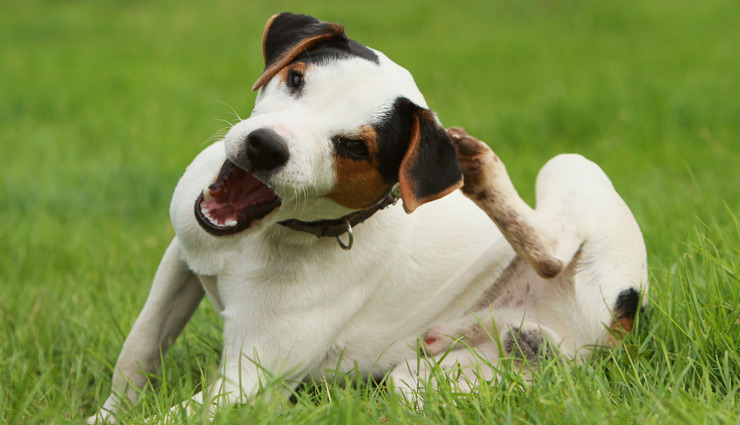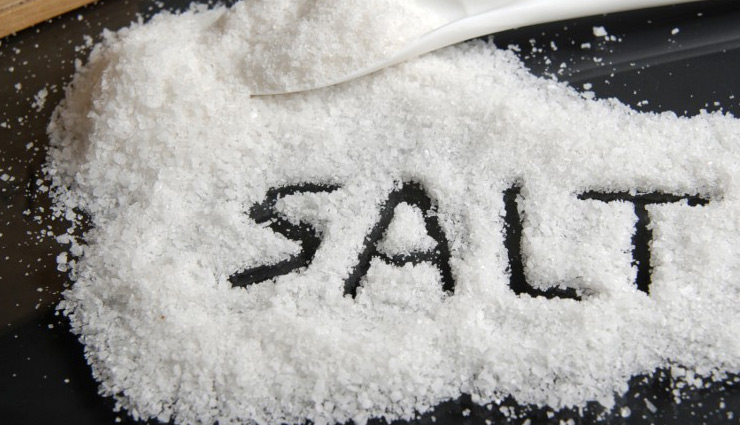
Fleas can jump around from pet to pet, and pet to human. They can move into your house without paying rent or doing the dishes.
Fleas may be merely tiny creatures, but even small pests can cause havoc and frustration. Plus if they become a huge problem then the expense to get rid of them increases dramatically.
However, there are methods that you can do to stop a massive flea infestation at its root, or in this case, your pet’s roots.

Salt is a common household item that is easy to find and cheap to buy. It dehydrates animals and this is what you want to happen to the fleas. Take a lot of salt and spread it all over your floors and carpets.
Leave it to stand overnight. In the morning you can vacuum clean the floors and carpets sucking up the salt and dead flea bodies. Salt needs time to attack the eggs and fleas for about 10 to 12 hours to get the job done.
White or apple cider vinegar can also be used to rid your house and pets of the jumpy pests. You can even feel like a bit of a warrior going into battle to defend your land.
Take an empty and clean spray bottle and fill it with 40 percent water and 60 percent vinegar. Shake it around until it is all mixed up together. When it is ready, spray it around your furniture (aiming for the corners since this could be a great place for fleas to find). You can also spray some on your pets and bath them later if you are not a fan of them smelling like vinegar. However, do avoid spraying this liquid on their nose, eyes, and mouths.
Then you can aim for the rest of your house including the bedrooms, study, dining room, balcony, etc. This spray should work quicker than the salt since it should take about 10 minutes to kill the fleas. We would suggest that once you have finished spraying around the house to use a flea bomb to get the areas that you may have missed.
Vacuuming is not only a way to get rid of fleas but it can also be a prevention method. Preventing eggs from hatching is a great way to decrease the chances of fleas growing and hopping around your house. However, if you see that your dog is acting differently, and notices that they are itchy as well as scratching themselves a lot then you have a flea problem. This means that you should increase the number of times you vacuum. About two to three times a day should help. This may seem like a lot but it will help decrease the spread of fleas and help out your family and pets in the long run.
Vacuum not only your floors but the couches, and beds (yours, your children’s, pet’s beds and even guest rooms to be on the safe side). You should also get your vacuum cleaner into the corners of the rooms. When you finish a round of cleaning you should empty the vacuum bag. However, instead of throwing it away in your kitchen bin, take the effort to take it outside away from your house and empty it in the bin on the street.
You do not only need to vacuum your beds but to give the bedding a go clean and dry. Strip all the beds in your house (dog’s included) and give them a spin in the washing machine. Once done get the wet materials into a drier. Set the temperature to high but if you are worried about damaging your bedding then a medium temperature can also work. Once the drying process of the machine is finished you should clean out the lint catcher. Here you will notice the fruits of your labor since there will be tiny dead bodies of fleas.
After every step, you can use some flea bombs that are safe for pets to make sure to get all those buggers. Then run the vacuum over one more time to get the bodily remains. Now that we have spoken about how to get rid of fleas in natural ways, let us move on to how to help your dog with the aftermath of having fleas living on their bodies.
Vitamins can be a great thing to tackle itchy skins on dogs, especially Vitamin E. Get some Vitamin E in a liquid form and gently spread it over your dog’s body. Pay attention to the areas that seem to be redder than the others. This can mean that these were bad spots for them that they kept on trying to scratch hence the redness. Not only is this a great way to decrease their itchiness but it can also comfort them since you would be petting them.
Low-fat yogurt has more benefits than just being a tasty add-on to a meal when it comes to feeding it to your dogs. Yogurt can keep the good bacteria in their intestines as well as add a boost to their immune system. The latter can help them fight off the itchiness of the flea attack. Plus, it can also help with ear infections. It is almost like a medical meal but consult with your vet before you give them any food that is outside their normal diet.
Finely ground oatmeal can be added to your dog’s shampoo or let them stand in it in a warm bath. It is good for their skin. The more finely ground it is the easier it is to spread around in terms of the shampoo and adding it to the warm water.
If you see that your dog’s paws are itchy, as in they are biting on them, then they are inflamed. You can help decrease how uncomfortable they are feeling by using cooled-down tea. You can make Chamomile or Herbal tea in a bowel that you put in the fridge. This will make it cool down. Once it is cooled you can put your dog’s paws in it to help decrease inflammation. You can make some to put in a spray bottle to spray on their skin.
A bath can do wonders for a dog’s itchy skin but remember to get a shampoo that is designed to help ease their itchiness. If they are not a fan of wet baths you can give them a dry one by using a dry shampoo from the store or a homemade one.
And the last thing you should do to help ease their pain is to give them a brushing. It is a way to comfort them (particularly with a brush glove).